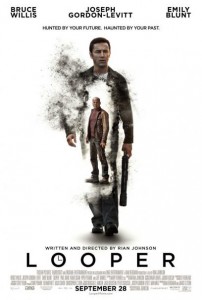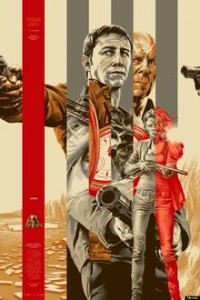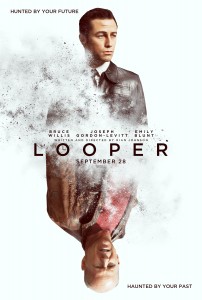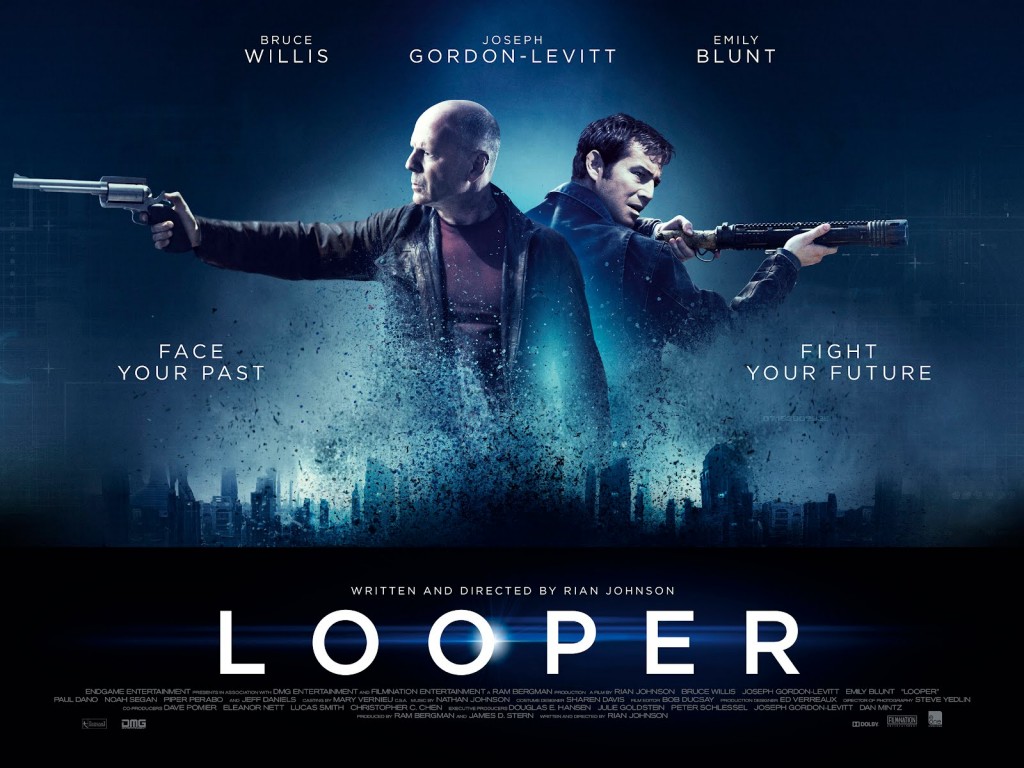If the vaguely dystopian America of Looper is any indication, writer/director Rian Johnson sees a very selfish doom in our future.
Looper is a stunning work of scifi action cinema that is as entertaining as it brilliant, as brave as it is meticulously tuned. It owns being a “time travel” movie in both structure and style, with clever exploitation of its premise, and a story that ultimately grows much bigger than the story of one man on the run. Looper is not just a time-travel crime film- when our hero is forced to hunt himself down, the story progresses into something much bigger that places stakes into the very future of humanity. It’s a future that’s very much in question, as the world of Looper is one that seems on the fast track to outright dystopia driven by the self-absorption and apathy of the doomed…
 Johnson’s vision of the country three decades from now avoids obvious signifiers of just what went wrong- you’ll see nothing as obvious as people with mobile phones surgically attached to their heads (mobile devices are almost an after though, in fact). Rather it’s through glimpses of tent cities, the lifestyles of the privileged, allusions to “the vagrant raids” and a sort of perpetual hangover every character seems to live within that suggests the American middle class has become entirely swallowed up by a vast chasm of inequality. Amidst this broken society we meet the Loopers, an organization of broken individuals who are thrust into a high-class lifestyle based on an explicit agreement that they will become murderers for the length of a contract that is terminated by them taking their own, delayed life. You see, this future is perforated by the invention of time-travel in an even more distant future, and these Loopers eliminate targets of organized crime that are sent back from 2074(ish) to 2044, where and when it is still possible to cleanly dispose of a body. These contracts dissolve when the Loopers –who typically receive bound targets loaded with silver that are immediately shot and anonymously discarded– find a final gold payoff included with their victim, who is in fact themselves 30 years older.
Johnson’s vision of the country three decades from now avoids obvious signifiers of just what went wrong- you’ll see nothing as obvious as people with mobile phones surgically attached to their heads (mobile devices are almost an after though, in fact). Rather it’s through glimpses of tent cities, the lifestyles of the privileged, allusions to “the vagrant raids” and a sort of perpetual hangover every character seems to live within that suggests the American middle class has become entirely swallowed up by a vast chasm of inequality. Amidst this broken society we meet the Loopers, an organization of broken individuals who are thrust into a high-class lifestyle based on an explicit agreement that they will become murderers for the length of a contract that is terminated by them taking their own, delayed life. You see, this future is perforated by the invention of time-travel in an even more distant future, and these Loopers eliminate targets of organized crime that are sent back from 2074(ish) to 2044, where and when it is still possible to cleanly dispose of a body. These contracts dissolve when the Loopers –who typically receive bound targets loaded with silver that are immediately shot and anonymously discarded– find a final gold payoff included with their victim, who is in fact themselves 30 years older.
Every looper knows the deal so, as Joseph Gordon-Levitt’s Joe notes, it is not a profession that attracts forward-thinking individuals.
Through the Loopers we see a society of people who are selfish, drugged up, and otherwise living entirely in the moment as even for those with means the world does not seem to offer much in the way of long-term possibilities. Even a small portion of the population that have developed light telekinetic powers employ them as tricks to impress people in bars- whatever latent new abilities these people have, they’re not making the most of them. It’s a distressing promise of self-perpetuating decline, juxtaposed with the view of Shanghai where hope and promise seem to live. Lest you wonder if the Chinese co-finance arrangement leaves any fingerprints, take for example that one character stubbornly contemplating a move to France is explicitly advised to move to China by a character who notes that he’s from the future (fortunately the delivery of that advice is brilliant).

The future as seen in Looper is one with bigger cities, aged cars (most retrofitted to some post-combustion system), a few more robots, and some hover cycles yet it’s entirely familiar. Again, the suggestion seems to be that progress and invention have ground to a halt in the decades to come, so 2044 doesn’t look all that much different from 2012. Though a time-travel film, Looper plays with the concept more in the sense of cause-and-effect relationship as different versions of the same individual run around. An amazing montage summarizing what I would call the “Bruce Willis Eventuality” of Joe’s life gives us some glimpse of the farther future, but mostly the time travel and its “rules” are simple and conventional, whereas the clever demonstrations of them are anything but. The action develops from Young Joe searching out Old Joe when he escapes the usual loop-closing self-murder, making Young Joe himself a target of every aimed gun in the city. The expected treat of parallel badassery from Bruce Willis and Joseph Gordon-Levitt ultimately evolves into a much bigger plot that will change the destiny of humanity, with the script beginning to emphasize elements of the film the trailers have held back on as the time-travel and Looper exposition recedes.
Despite being a lonely, shitty guy, Young Joe is our hero and Joseph Gordon-Levitt effortlessly takes on the Bruce Willis bravado. Bolstered by a make-up job that gives him a Bruno nose, redefined mouth and more Willis-like eyes, JGL is not subtle about delivering the film’s spare narration and smart-ass dialogue like a John McClane in his prime, though don’t for a second think there’s not a real performance with a unique beating heart beneath the affectations. Gordon-Levitt’s Joe is a truly lost soul and a heavy user of the eye-dropper dispensed future coke that the Loopers enjoy, and though he’s troubled by an early decision that sells a friend up the river in order to maintain his financial status, you get the sense that he’d probably make that decision again.
Once everything is flipped upside down, Young Joe is as eager as anyone to gun down his older self- however empty and unfulfilling his life may have been up till that point, the boy wants it back. Old Joe however, has been ripped from a future in which he’s found a very real life –something like redemption– and is willing to do some very extreme, terrible things to preserve that eventuality for himself. It’s here that Johnson shows real bravery through the places he’s willing to take this story, and formidable skill in how he’s able to portray these moments without losing his audience. Not only does Johnson carefully handle key moments and trust in Bruce Willis to hit the right notes in their wake, but the script also perfectly times other revelations about characters that ensure the film earns every difficult choice. With directing, writing, and performance working in such delicate concert you’re witnessing clockwork filmmaking, and it’s a wonder to behold.

Johnson’s skills behind the camera have always had an effortless style to them in which every camerawork mannerism pushes along a moment or an emotional beat- beyond the clever dialogue and cute conceit, this is what makes Brick so special. Here Johnson takes it up a notch once again and finds gorgeous, innovative ways to capture and stage action, conversation, and visual exposition. It’s true that the occasional effects shot borders on clunky, but Johnson’s filmmaking still scales up for action very effectively. It’s not just how he moves the camera- beats within scenes are staged with such confidence that the way someone flips up a gun or slams a door helps drive a scene deeper into your mind and punctuate dialogue.
The production design and costuming are remarkable and perfectly support that aforementioned vision of a decaying, if not fully dead America (just imagine the whole country is future Detroit). Precise, indispensable sound design is built into the architecture of the edit, while Nathan Johnson’s propulsive, haunting score explores a variety of textures and techniques that fit the varied landscapes of the grungy city and the dusty cornfields where much of the film takes place. All this together represents a deep level of sophistication that permeates every level of the filmmaking and gives the film that groundbreaking, instant-classic quality.
Going back to performances, Willis is as confident as you would expect in this role, but this is surely one of his most nuanced performances in ages (with Moonrise Kingdom, it’s a good year for him). It’s rare that a film pulls weakness and deep-seated desperation out of Willis when he’s in action mode, but it’s all on the table here and by the time Willis does unleash a superhuman hail of pain, he’s goddamned earned it. With such iconic performances from the two leads, the buttressing supporting cast has to be awfully strong to stand out, and from Emily Blunt to Paul Dano to the steely Garret Dillahunt they’re all spectacular. Blunt in particular has a great rapport with Levitt, but it’s her chemistry with the frighteningly cogent performance from 7-year-old Pierce Gagnon that will stick with you. Jeff Daniels gives an appropriately lazy turn, and has several of the film’s best line deliveries .
Avoiding the bigger events of the second and third acts means very vague praise for some of the film’s best elements, but suffice to say that the level to which Looper gets taken by its end moments and the perfect series of events that actually conclude the story are just this side of magnificent. This is now a classic science fiction story, and like the best of the genre it also pays off and re-visualize pioneering work from those that came before. The obviously influences like Phillip K. Dick, Ridley Scott, and The Wachowskis are all there, while Katsuhiro Otomo is eventually revealed as a big influence as well. One would expect that namedrop in particular will raise some eyebrows…
 It’s rare that a film demands an instant rewatch both because of its rewarding intricacies and because it’s so damned entertaining, but something about the best scifi action does just that. Looper stands confidently alongside thoughtful, contemporary blockbusters like The Matrix and Inception, while preserving so much of the intimate details of films like Primer and Moon. Rian Johnson has proven himself a worthy studio filmmaker who has vision enough to fill out a large budget and give us bigger ideas to match the bigger films. Looper would be a contender for best film in any year it was released, and this year it stands out from all other blockbuster efforts by a large stretch. It deserves virtually every positive adjective you can throw at it and it is the kind of film with which a message can be sent to the studios that audience are hungry for ideas with their spectacle.
It’s rare that a film demands an instant rewatch both because of its rewarding intricacies and because it’s so damned entertaining, but something about the best scifi action does just that. Looper stands confidently alongside thoughtful, contemporary blockbusters like The Matrix and Inception, while preserving so much of the intimate details of films like Primer and Moon. Rian Johnson has proven himself a worthy studio filmmaker who has vision enough to fill out a large budget and give us bigger ideas to match the bigger films. Looper would be a contender for best film in any year it was released, and this year it stands out from all other blockbuster efforts by a large stretch. It deserves virtually every positive adjective you can throw at it and it is the kind of film with which a message can be sent to the studios that audience are hungry for ideas with their spectacle.
Looper is incredible, and you simply can not miss it.
Rating: 




Out of a Possible 5 Stars
